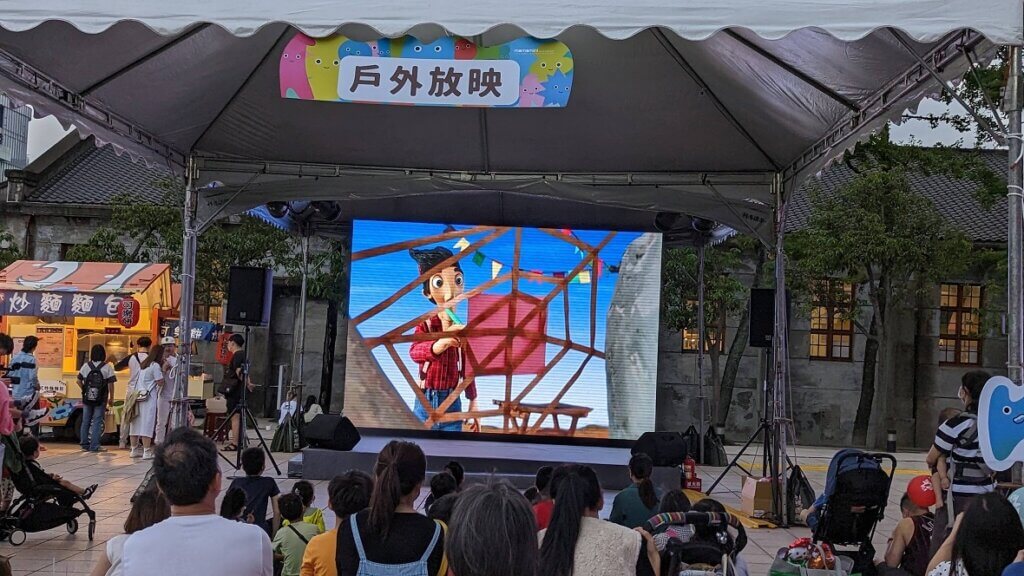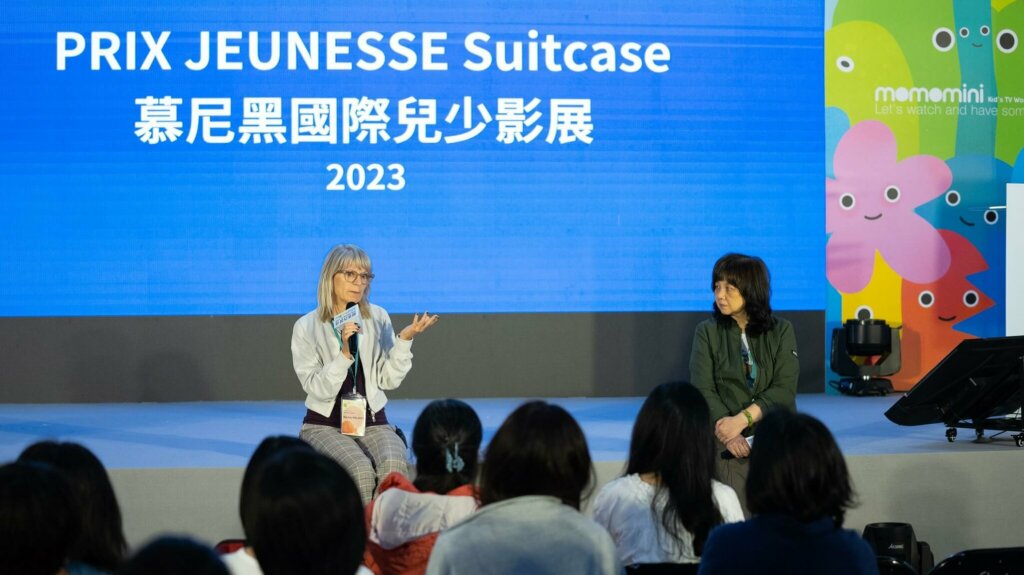
The PRIX JEUNESSE Suitcase Inspires Kids and Professionals in Taiwan


At this year’s Taiwan momo mini Kid’s TV Wonderland we were thrilled to have two screenings with the PRIX JEUNESSE Suitcase, one addressing film and television professionals, and one event for parents and children in the outdoor area. We arranged a grassy area with tents and booths so that kids and parents felt comfortable and could enjoy the movies. We especially invited Eric (Chen Jianrong), an exceptional film education teacher who once participated in PRIX JEUNESSE, to be our host. He introduced the background knowledge and special features of the selected films in a lively and enthralling way. He guided the children to observe and analyze elements and meanings in the movies, taking them on a journey into the world of film.
At the beginning of the event, Eric asked the participants to guess which countries the movies were from. Due to the viewing habits of Taiwanese children, the answers naturally tended to be “United States” or “China.” Through this opening activity, Eric told the children there that there are excellent works from many different countries and introduced the prestigious and meaningful PRIX JEUNESSE to the attendees.
The screening event was divided into two parts: preschool-aged children (0-6 years old) and school-aged children (7-10 years old). The selected films included exciting children’s works from countries such as Japan, Russia, Germany, and France. The aim was to broaden the children’s perspectives and expose them to different cultures and storytelling styles. These films included animation, live-action, documentaries, short films, comedies, dramas, adventures, fantasies, and even fables. Each film has its unique charm and message; it sparked thinking in a delightful way. Around 60 parents and children joined us for this captivating movie experience! During the screening, children sometimes whispered and discussed the plots with their parents. This can increase interaction and emotional connection between parents and children and help parents understand their children’s thoughts and reactions. Some films might touch upon deeper or more complex topics or issues, such as disabilities, discrimination, poverty, and war. Parents can explain and discuss with their children in those moments, helping them develop the correct values and empathy.
After the film screenings, Eric invited the children to come up on stage and share the moments they remembered the most from the movies, along with their favorite characters and what they learned or gained from watching the films. This activity encouraged deeper thinking and understanding of the film’s content and messages and cultivated their ability to express themselves and communicate. The children enthusiastically participated in the discussions, sharing their views and feelings about the movies. Under the guidance of Eric, we harvested many voices from the children. For example, they admired the cleverness of the protagonist in “KOYAA – ELUSIVE PAPER” for finding solutions to problems. “WOMBO” became a favorite among the children, not only because the protagonist is a funny potato but also because the story included elements of dogs that they really enjoyed. The adventure story of “PYTHAGORASWITCH: THE MARBLE BORTHERS’ GREAT ADVENTURE!” was also highly appealing to the children, and they were thrilled by the adventures of the three marble balls.
“THE SUMMER WITH DAD” is a movie that has subtitles and dialogue, but kids can understand the whole story just by watching the images. Eric asked the children if they wanted to help their mom and dad with their haircuts. Almost all the kids raised their hands! Similarly, “MAXIM – THE GREATEST” is a documentary about a Russian kid who doesn’t have legs but is strong and brave in pursuing his dreams. Even though it is different from the usual animated movies they watch, young children can still quietly enjoy this touching documentary. Many parents and kids had tears in their eyes. “MOYAMOYA THEATER: NANA, NANA” is an episode that allows children to feel the emotional changes between a grandmother with dementia and her granddaughter. Even preschool kids repeated the mesmerizing spell “Moyamoya,” which surprised the director from Japan.
Besides the sharing from kids, Eric also used a world map to show which country each film came from. This helped the children understand different cultures better. The children noticed that many movies they watched came from European countries. Eric then explained that many European countries believe that “introducing excellent children’s films to kids from a young age can reduce many social issues.” Then Eric invited the participating families to enjoy more exciting Taiwanese-made programs at the exhibition venue.
The collaboration between Fubon Cultural and Educational Foundation and PRIX JEUNESSE was a very precious and pretty experience in the field of Taiwanese film education. Together, the children witnessed various abilities and emotions showcased in the exciting children’s films from around the world during the outdoor screening activities. This event provided a high-quality movie-watching experience and a profound life education. We hope to have more opportunities like this in the future so that more children and parents can enjoy the beauty and growth of film education.
PRIX JEUNESSE Suitcase for media experts
On the third day of Taiwan momo mini Kid’s TV Wonderland, we did a presentation of the “PRIX JEUNESSE Suitcase” for an audience of media professionals. The best comes for last: The Suitcase is packed with the best and most innovative program entries from each PRIX JEUNESSE festival. After watching many exciting children’s shows from Asia and Australia in the previous two days, the “PRIX JEUNESSE Suitcase” brought us a different perspective with programs from Europe and South America.
The Suitcase was hosted by Marney Malabar, the former Head of Kids TV at TVO Canada, and Kirsten Huang from Shih Hsin University’s Media Literacy Research Center. Most attendees were experienced professionals in the field of children’s programming, including producers, directors, and program planners, many of whom were familiar with the PRIX JEUNESSE INTERNATIONAL Festival. After each show, we split into small groups and talked about what we thought of the programs. It was an excellent opportunity for us to exchange ideas.
We watched seven spectacular programs from PRIX JEUNESSE INTERNATIONAL. The first half showcased the Colombian production “Emoticons” and the Danish production “MICRO FRIENDS,” both of which explored the theme of “death.” “Emoticons” portrayed the sadness experienced by children when they lose a pet, while “MICRO FRIENDS” allowed children to observe insects and organisms on a dead fox. Marney Malabar highlighted the girl taking the initiative in the ecological program “MICRO FRIENDS,” it was great to see the positive representation of gender issues. The bold and powerful visual presentation in “MICRO FRIENDS” sparked a lot of discussion. We even did a quick survey to see if people thought this show could be shown on Taiwanese TV, but nobody thought it had a chance. It was a surprising result that made us think about how we can break the limits and rules of children’s shows in Taiwan.
The BBC’s “LET’S GO FOR A WALK” and the Netherlands’ “TALKING HEADS” also left a lasting impression. “LET’S GO FOR A WALK” demonstrated an exemplary program format; the host was also a perfect role model. Hamza Yassin, originally from Sudan, respected what the kids said and made them feel competent and confident on the show, thereby adding multicultural content to the program. The composed manner of the hairstylist host in “TALKING HEADS” and the poignant stories shared by children were equally unforgettable. These shows helped us understand the importance of different cultures and kids’ voices in children’s shows. “TALKING HEADS ” was a favorite among many people.
The second half of the screening showed three animated shows: “MY BODY BELONGS TO ME” from Norway, “AnimalXs” from Colombia, and “JOHN DILLERMAND” from Denmark. These programs focused on sex education for children and adolescents. “My Body Belongs to Me” used clear words and animations to help kids understand. “AnimalXs” turned teenagers into animal characters, reducing any discomfort that may arise when watching the program.
At last, Denmark’s “JOHN DILLERMAND” sparked heated discussions. The protagonist of this stop-motion animation program is a man with an extraordinarily long penis, challenging preconceived notions of children’s programs and initiating conversations on gender concepts, gender equality, and gender roles in children’s programming.
“These programs from the PRIX JEUNESSE Suitcase were very inspirational, stimulating discussions on the changes we can make in Taiwanese children’s programs, and also when facing sensitive and complex topics, how should we express and present them clearly and gently? Here, we come together as a whole to imagine an ideal future for children’s television in Taiwan.
